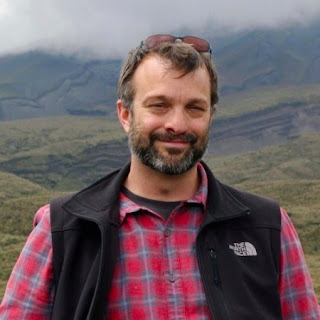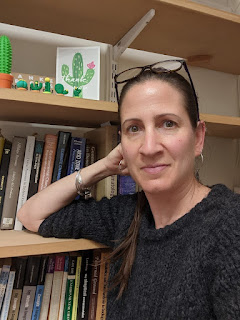 |
| Dr Paul Harper (left) and Professor Tom Scott (right) |
In conversation with Professor Tom Scott and Dr Paul Harper, theme leads at the Cabot Institute
Why did you choose to become a theme leader at Cabot Institute?
T.S: There is no single technology solution for our low carbon energy and net zero ambitions. Therefore, being a theme leader gives me the chance to work and coordinate research from all areas, such as wind, solar, nuclear and hydro, so we can work together to develop solutions.
P.H: I became increasingly inspired by renewable energy during my time at Bristol studying Aerospace Engineering (2000-2004, a long time ago now!). I know this is a real cliche, but I wanted to do something with my career that would help tackle some of the major challenges facing society around climate change and environmental sustainability. After completing my undergraduate degree and a PhD at Bristol in composite materials, I began a postdoc research post linked to tidal energy devices and also became involved in some the early development work of the Cabot Institute, so it has always had a special place in my heart. 10 years on and it is great to look back on so many new research developments in Low Carbon Energy and environmental sustainability more generally that have taken place across the University because of Cabot.
In your opinion, what is one of the biggest global challenges associated with your theme?
P.H: This is biased towards my interests in renewable energy, but I think the following are all major challenges associated with the Low Carbon Energy Theme:
- Bringing down costs of both mainstream technologies (wind, solar) and more novel, less mature technologies (e.g., wave, tidal).
- Applying circular design principles to prevent material going to landfill at end-of-life.
- Designing improved ways of storing energy and integrating many distributed energy supply sources.
- Electrification of the heating and transport sectors to increase the potential contribution of renewables.
T.S: Replacing fossil fuels with a mixed portfolio of viable and renewable alternatives. This is the fundamental challenge to tackle if the UK is to reach its 2050 Net Zero target, and if we are to provide reliable energy sources for future generations globally.
As we are looking into the future, what longer term projects are there in your theme?
T.S: In my specialist area of nuclear energy, there are several major projects and technologies in development to support low carbon energy production:
STEP – the Spherical Tokamak for Energy Production (STEP) programme will develop the world’s first commercial fusion plant in the UK, with a site set to be selected by the end of 2022. Complementary, large scale international consortia fusion projects ITER and DEMO are already underway.
Geological Disposal Facility (GDF) siting – The UK has begun the search for a site where radioactive waste can be stored permanently in a way that doesn’t burden future populations. We have to show we can deal with the waste produced by nuclear fission energy production to ensure support for nuclear power as a key low carbon energy source.
Advanced Modular Reactors (AMR) – We need to get the most from existing fission power, wherein there is much more value we can get from just producing electricity. Heat, Hydrogen and direct air-capture of CO2 are all viable from nuclear and AMRs, which operate at higher temperatures are the way to best exploit these other opportunities which will provide much more value than the current electricity-only proposition.
What’s more, Hydrogen will be the largest growth commodity in the next few decades. It gives us the opportunity to address issues around energy storage and transfer and especially, decarbonisation of transport, either directly as fuels for cars or indirectly as a precursor substance for making ammonia which can be used in heavy transport e.g., shipping.
Alongside all these technology developments, we will need to see a change in energy transport and storage infrastructure. For example, hydro or battery storage can help mitigate the intermittencies suffered by solar or wind. Equally, we cannot immediately swap methane for hydrogen in our domestic gas network and hence we need to upgrade or replace our infrastructure, with the former being much preferable and affordable.
Bringing the public along on this transitional journey will be incredibly important because they need to understand and support some of the tough technical decisions that need to be made.
P.H: A huge proportion of the world’s population has no existing access to a sustainable electricity supply and working on international development projects is vital to ensure communities can improve quality of life through access to low carbon energy. We currently have a rapidly growing portfolio of projects linked to international development and I think this trend is likely to continue in the future.
We are lucky to have a very large number of projects across a wide variety of different areas. The Cabot website gives a very good flavour of our diversity of projects (Energy | Cabot Institute for the Environment | University of Bristol) and these involve collaborations with a range of multinational companies, SMEs and start-ups, NGOs and policy makers.
Across the portfolio of projects in your theme, what type of institutions are you working with? (For example, governments, NGO’s)
T.S: The Government and its research organisations including National Nuclear Laboratory, UK Atomic Energy Authority. I am also a member of the Nuclear Innovation & Research Advisory Board (NIRAB).
Working with other Universities in the UK and overseas as well as government research organisations and industry. It’s important that all these parties are talking and working together to ensure that there is both a push and a pull for the research we are doing towards net zero carbon by the middle of the century.
Please can you give some examples and state the relevant project.
T.S: My fellowship awarded earlier this year (Research Chair in Advancing the Fusion Energy Fuel Cycle) has the remit of doing just that. Being funded by the Royal Academy of Engineering and UKAEA, but with the remit to work with (and pull together) other academics with companies across a wide spectrum, from Cornish Lithium, to Rolls-Royce, EDF, Hynamics, Urenco and many others to advance the fuel cycle for future fusion power stations but also to develop spin-off opportunities in hydrogen storage, isotope production and even diamond batteries!
The South West Nuclear Hub provides a focus for civil nuclear research, innovation and skills in the South West of the UK, bringing together a strategic alliance of academic, industrial and governmental members, creating a unique pool of specialist talent and expertise that can be tapped into by industry
What disciplines are currently represented within your theme?
P.H: I’m sure I’ve missed some out but the main ones that spring to mind Engineering (all disciplines), Physics, Chemistry, Geography, Sociology, Economics and Law. We also have particularly close link with Cabot’s Future Cities Theme.
In your opinion, why is it important to highlight interdisciplinary research both in general and here at Bristol?
T.S: It’s quite simply because some of the big societal challenges are so multifaceted that they de facto require a multidisciplinary solution! At UoB we have a wealth of expertise and a wide network of collaborators that we can draw on to address key aspects around energy.
We can’t do everything, but we have been working hard to understand what we’re good at, our USPs and we’ll be concentrating on strengthening these going forwards as well as developing new opportunities.
P.H: In order to implement effective low carbon energy systems in society, interdisciplinary research is vital. You can design the most innovative and technically brilliant energy technologies but if they are not well suited to the social and economic environment where they will be deployed, they are of very limited value. For example, the type of energy system best suited to a UK community can be very different to the best solution for a community in the developing world, which may have no existing electrical grid infrastructure, relatively little access to skilled labour for installation/maintenance and relatively low incomes.
Are there any projects which are currently underway in your theme which are interdisciplinary that you believe should be highlighted in this campaign?
T.S: STEP is a classic example; you’d be forgiven for thinking it was just a big physics project (because this is what it was for many years) but now it is actually a huge interdisciplinary effort involving engineers, computer scientists, materials people (like myself), environmentalists, economists, and social scientists. The Physicists are still there working very hard too, but they are complemented by all this other activity which will help deliver this big scientific ambition into an actual working power station.
Is there anything else you would like to mention about your theme, interdisciplinary research and working as part of Cabot Institute?
P.H: It is essential to remember importance of teaching alongside research; the University are training the next generation of graduates who can address society’s environmental challenges and Cabot can play a key role in this through initiatives such as the Cabot MRes programme. I’m very pleased that within the Low Carbon Energy Theme, our members are playing a very active role in supporting both undergraduate courses and postgraduate study opportunities linked to Low Carbon Energy topics such as renewable energy.
T.S: The Cabot Energy theme is open and inclusive for anyone and any discipline! We enjoy a healthy debate about energy and the pros and cons of how we produce it, distribute it and use it. We’re proud to have different opinions and an open forum for discussion.
Please do come and join us even if you’re the tiniest bit curious and would like to help contribute to our collective efforts.
For more information, visit Low Carbon Energy.






